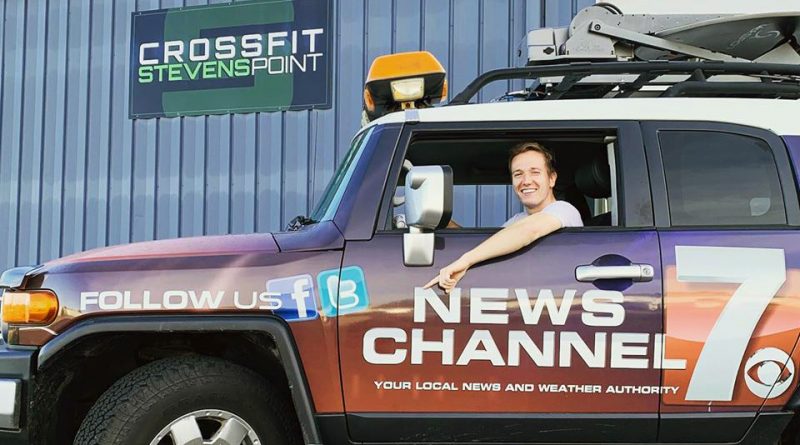SPASH grad departs WSAW newsroom for Sentry PR
By Brandi Makuski
Brian Will has been out of the news business for just one week, and he already misses it.
“I was watching some of the coverage on the (Wausau) shooting, watching how they reported it, the camera positions, things like that,” Will said from a table at Ruby Coffee Roasters in Stevens Point on Jan. 17. “I think we all critique each other, look at those details; I think that’s a natural part of the job.”
Will, 26, bid farewell to coworkers and viewers at WSAW Channel 7 on Jan. 10, where he’d spent two-and-a-half years covering news across the Central Wisconsin viewing area.
“Growing up, I was always interested in the news, and I would always watch the news with my family,” he said. “I kind of saw what it was like, at least for TV journalists, and I was always interested in that. I always respected the people who told us what was going on in the world.”
But it wasn’t until high school that Will learned he might be fit to report the news professionally. He took a video production class to fill an elective at SPASH, which led to an in-school television spot making the morning announcements.
“I thought, ‘Oh, I could do this for a living,’ and that’s what led to going to Oshkosh for that degree,” he said.
After getting a degree from UW-Oshkosh in Radio, TV, and Film, and Political Science, Will said he planned to apply to a graduate school program in Eau Claire. But when he heard about an opening at WSAW, he applied for both.
Will took the Channel 7 job as a 9 p.m. producer—a job that designs the way a newscast looks. It’s not a typical first step for a greenhorn in the news business.
“At first, I had no idea what I was doing, it’s really overwhelming,” he said. “Luckily, I had some really good people that [sic] trained me and kind of mentored me as to why we do certain stories, what’s important, and how certain things go into them. It wasn’t until about six months in that I really felt I was getting the hang of it, and about a year in, I signed a new contract to be a reporter.”

During his time covering the news, Will said a few stories stand in his mind. Last March, WSAW flew him to California, where he covered a group of educators learning about the Marine Corps Recruit Depot in San Diego.
“It was really an enlightening experience,” he said. “It was just me, and I had to get five days worth of stories.”
The Portage Co. Emergency Services Citizens Academy also tops Will’s list of favorite stories—one that showcased citizens undergoing some of the training required for local police, fire, and EMS personnel. But Will wasn’t permitted by his employer to participate in the ceremonial, albeit voluntary, tasing some participants endure at the end of the program.
“My boss wouldn’t sign off, for insurance reasons,” he said, then added, chuckling, “The cops have still offered, if I want to get tased, I can go down to the police department anytime.”
There were other stories, too, that Will hoped to tell but couldn’t, because a source wouldn’t go on the record, or they couldn’t get both sides of a story—he knew that came with the job. But about a year ago, Will said he began having second thoughts about making the news his career.
“When I started looking at options of where you can go or what you can do—and you hear from other people who have gone off to different stations—that the pay doesn’t really go up, and they’re still kind of struggling to get by,” he said. “And unless you’re jumping to a bigger market, a lot of the stories are the same. That’s when I started thinking: if I want to move up, I’m going to have to keep jumping around, because I’ve done everything I can do here. My heart is still in the news, but if I want to start having a family, or having a life, what’s the next step?”
Beyond the desire to advance professionally, Will said the job also comes at a price he’s not sure he’s willing to pay.
“When I was first in [the industry], I was excited and I would tell people about how cool it is,” he said. “But after a while, it’s hard to tell people about the industry because you really have to endure the long hours and the low pay for a long time before you can maybe get to where you want to be.”
Will also has concerns about the future of the news business, saying it’s “so up in the air right now.”
“You’re kind of taking a gamble or a bet when you go into it,” he said. “It’s tough, so you’ve really got to be committed to it. It’s important. Who else is going to keep people accountable? We need people to be there so the community knows what’s going on.”
Next week, Will takes on a new role working in the public relations and marketing office for Sentry, a job opportunity he says makes him feel “nervous and excited.” He’s not the first to make the leap—Sentry already employs at least one former news reporter in its PR office, as do UW-Stevens Point, Aspirus, and other local companies—but says he’ll miss connecting with his viewers.
“Just getting into the industry and getting your feet wet, there’s a lot of learning by mistake,” he said. “Just as I feel I’m getting really good, I’m getting out. I’ll miss it, but I think this is the right move.”
He’ll also miss the camaraderie he’s experienced working with other local news outlets.
“We’re all in it together; I’ve helped another station set up their equipment, we’re all super helpful and friendly,” he said. “I have faith in some of the people who are in it, I have faith in the people I’ve worked with, and I hope they keep going.”
Will says he also hopes someone can figure out a brighter future for sustaining community news.
“As a reporter, you put yourself out there. I think people trust you more if you’re from the area or if you’ve been doing it for a long time,” he said. “I hope in the future we can figure out a way to keep reporting the local issues that matter and have these giant corporations in Atlanta, New York, L.A., that own these small newspapers in Small Town, U.S.A.—they don’t really care what’s happening in the local area. As someone from the area, I care about what’s happening.”
What won’t Will miss about the job? The big egos. Working in the cold. No sleep.
“I’m sleeping. I’ve gotten so much sleep this week,” Will said, laughing. “I’m not stressed, I’m getting plenty of rest…I’ll miss the adrenaline rush of it, going to stories, or when you’ve got to figure out what’s going on 30 seconds before you go on air. I’ll miss all that. But there’s no incentive to stay in these smaller areas when you can’t really make a living.”

